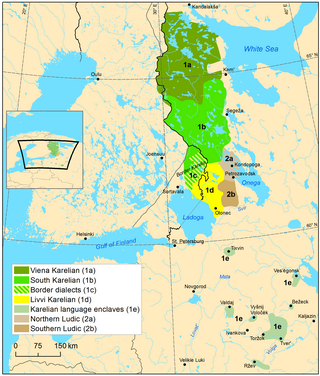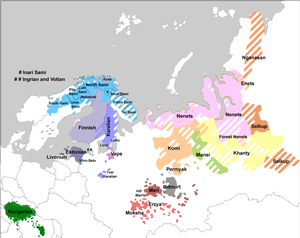Livvi-Karelian language
You can help expand this article with text translated from the corresponding article in Finnish. (May 2021) Click [show] for important translation instructions.
|
| Livvi-Karelian | |
|---|---|
| Ливви | |
| Native to | Russia, Finland |
| Region | between Lake Ladoga and Lake Onega, northward of Svir River, Karelia |
| Ethnicity | Olonets Karelians |
Native speakers | 14,100–25,000 (2000–2010)[1] |
| Latin (Karelian alphabet) | |
| Official status | |
Recognised minority language in | |
| Language codes | |
| ISO 639-3 | olo |
| Glottolog | livv1243 |
| ELP | Livvi |
 | |
 Olonetsian is classified as Definitely Endangered by the UNESCO Atlas of the World's Languages in Danger (2010) | |
| People | Karelians |
|---|---|
| Language | Karelian; Livvi-Karelian |
| Country | Karelia |
Livvi-Karelian[6] (Alternate names: Liygi, Livvi, Livvikovian, Olonets, Southern Olonetsian, Karelian; Russian: ливвиковское наречие, romanized: livvikovskoye narechiye)[6][7] is a supradialect of Karelian, which is a Finnic language of the Uralic family,[8] spoken by Olonets Karelians (self-appellation livvi, livgilaizet), traditionally inhabiting the area between Ladoga and Onega lakes, northward of Svir River.
The name "Olonets Karelians" is derived from the territory inhabited, Olonets Krai, named after the town of Olonets, named after the Olonka River.
History
[edit]
Before World War II, Livvi-Karelian was spoken both in Russia and in Finland, in the easternmost part of Finnish Karelia. After Finland was forced to cede large parts of Karelia to the USSR after the war, the Finnish Livvi-Karelian population was resettled in Finland. Today there are still native speakers of Livvi-Karelian living scattered throughout Finland, but all areas in which Livvi-Karelian remains a community language are found in Russia.
Speakers of Livvi-Karelian may be found mainly in Olonetsky, Pryazhinsky, Pitkyarantsky, and partly Suoyarvsky districts of the Republic of Karelia.[9] Livvi-Karelian long remained relatively uninfluenced by the Russian language despite the large influx of Russians following the founding of Saint Petersburg in 1703.[citation needed]
Phonology
[edit]
Vowels
[edit]| Front | Back | |||
|---|---|---|---|---|
| rnd. | urnd. | rnd. | urnd. | |
| Close | i iː | y yː | u uː | |
| Mid | e | ø | o | |
| Open | æ | ɑ | ||
Consonants
[edit]| Labial | Alveolar | Palatal | Velar | Glottal | |||
|---|---|---|---|---|---|---|---|
| plain | pal. | ||||||
| Plosive | voiceless | p | t | tʲ | k | ||
| voiced | b | d | dʲ | ɡ | |||
| Affricate | voiceless | t͡s | t͡ʃ | ||||
| voiced | d͡ʒ | ||||||
| Fricative | voiceless | (f) | s | ʃ | (x) | h | |
| voiced | z | ʒ | |||||
| Nasal | m | n | (ŋ) | ||||
| Approximant | ʋ | l | j | ||||
| Rhotic | r | ||||||
- Consonants may also occur as geminated or long [Cː].
- Sounds /f, x/ are commonly heard from Russian loanwords.
- /h/ can have allophones of [x] or [χ].
- /n/ is heard as [ŋ] when preceding /k/ or /ɡ/.
- Palatalization [ʲ] may occur among different dialects when consonants are preceding vowels /i, y/.[10]
Alphabet
[edit]Livvi-Karelian uses the Latin alphabet and has the following letters in its alphabet, which is called the Karelian alphabet: Aa, Bb, Cc, Čč, Dd, Ee, Ff, Gg, Hh, Ii, Jj, Kk, Ll, Mm, Nn, Oo, Pp, Rr, Ss, Šš, Zz, Žž, Tt, Uu, Vv, Yy, Ää, Öö.[11]
Until 2007, the ü letter was a part of the Livvi-Karelian alphabet, which has been recommended by the Karelian language board to be instead be changed to the y letter.[12]
Grammar
[edit]Livvi-Karelian and its grammatical cases are quite similar to the Finnish language and other related Finnic languages.
The word 'food' in Livvi-Karelian cases:[13]
| case | singular | plural |
|---|---|---|
| nom. | syömine | syömizet |
| gen. | syömizen | syömizien |
| par. | syömisty | syömizii |
| ine. | syömizes | syömizis |
| ill. | syömizeh | syömizih |
| ela. | syömizes | syömizis |
| ade. | syömizel | syömizil |
| abe. | syömizettäh | syömizittäh |
| all. | syömizele | syömizile |
| abl. | syömizel | syömizil |
| ess. | syömizenny | syömizinny |
| tra. | syömizekse | syömizikse |
| com. | syömizen | syömizienke |
| prol. | syömizeči | syömiziči |
| term. | syömizessäh | syömizissäh |
| approx. | syömizellyö | syömiziellyö |
| acc. | syömine | syömizet |
Hello! - Terveh!
How are you? - Kuibo dielot?
Good night! - Hyviä yödy!
Good afternoon! - Hyviä päiviä!
Do you speak Karelian? - Pagizetgo (sinä) karjalakse?
I'm sorry. - Minul on žiäli.
You're welcome. - Ole hyvä.
I love you. - Suvaičen sinuu.
Goodbye. - Jiä tervehekse.
My name is ... - Minun nimi on ...
Excuse me. - Prostikkua.
Help! - Avvutakkua!
Cheers! - Teijän tervehyökse!
Right. - Oigei.
Left. - Hurai.
Yes. - Da.
No.. - Ei.
One. - Yksi.
Two. - Kaksi.
Three. - Kolme.
Four. - Nelli.
Five. - Viizi.
See also
[edit]References
[edit]- ^ Karjalainen, Heini; Puura, Ulriikka; Grünthal, Riho; Kovaleva, Svetlana (2013). "Karelian in Russia. ELDIA Case-Specific Report". Studies in European Language Diversity. 26. ELDIA. ISSN 2192-2403.
- ^ Change in the regulation by the president of Finland about European Charter for Regional or Minority Languages, 27.11.2009 (in Finnish)
- ^ "Законодательные акты: О государственной поддержке карельского, вепсского и финского языков в Республике Карелия". Archived from the original on 11 October 2017. Retrieved 8 January 2011.
- ^ Rantanen, Timo; Tolvanen, Harri; Roose, Meeli; Ylikoski, Jussi; Vesakoski, Outi (8 June 2022). "Best practices for spatial language data harmonization, sharing and map creation—A case study of Uralic". PLOS ONE. 17 (6): e0269648. Bibcode:2022PLoSO..1769648R. doi:10.1371/journal.pone.0269648. PMC 9176854. PMID 35675367.
- ^ Rantanen, Timo, Vesakoski, Outi, Ylikoski, Jussi, & Tolvanen, Harri. (2021). Geographical database of the Uralic languages (v1.0) [Data set]. Zenodo. https://doi.org/10.5281/zenodo.4784188
- ^ a b "Livvi-Karelian". Ethnologue. Retrieved 28 May 2011.
- ^ Moseley, Christopher (2007). Encyclopedia of the world's endangered languages. Psychology Press. p. 263. ISBN 9780203645659.
- ^ "Language Family Trees, Uralic, Finnic". Ethnologue. Retrieved 28 May 2011.
- ^ "Karelian Language", at the website about livvic culture
- ^ Sarhimaa, Anneli (2022). Karelian. Oxford Guides to the World's Languages (1st ed.): Oxford University Press. pp. 274–275.
{{cite book}}: CS1 maint: location (link) - ^ Pyöli, Raija (2011). Livvinkarjalan kielioppi (in Finnish). Karjalan Kielen Seura. ISBN 978-952-5790-25-2.
- ^ "Kirjaimikkuo suurendetah". Archived from the original on 24 September 2014. Retrieved 6 January 2024.
- ^ "VepKar :: Lemmas". dictorpus.krc.karelia.ru. Retrieved 17 October 2023.
- ^ "Useful phrases in Livvi-Karelian". www.omniglot.com. Retrieved 17 October 2023.
- ^ Craig Gibson, Digital Dialects 2020. "Digital Dialects Karelian games". www.digitaldialects.com. Retrieved 17 October 2023.
{{cite web}}: CS1 maint: numeric names: authors list (link)
External links
[edit] Media related to Livvi-Karelian language at Wikimedia Commons
Media related to Livvi-Karelian language at Wikimedia Commons- Oma Mua – a weekly newspaper in Olonets Karelian Archived 26 November 2020 at the Wayback Machine
- Livvi language resources at Giellatekno

